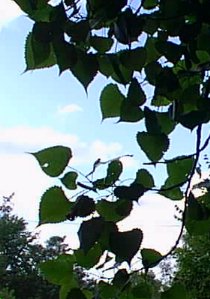Cottonwood Seeds
Airborne Immortality?
by Alan Harris
|
Today I won't rhapsodize much on cottonwood tree seeds, although they certainly can inspire a rapture. One might say that these seeds are merely a device to further cottonwoodism. They do form out of tree egotism, don't they?
Most people, too, want some kind of immortality, whether heavenly or earthly, such as through their gene pool, artistic creations, memories, or large recognized donations and bequests. Someone once said that in the eonic future, when the universe is coming to an end and only one last fragment of rock remains rolling in space, most people would secretly like to have their name carved upon this rock. What are the benefits that earthly kinds of immortality will give us? Any? Granted that they offer other people some benefits such as allowing new people to exist (birth), making others feel better (art), or disseminating the social easings and enhancings that monetary donations enable. What of our heavenly immortality? Yours. Mine. Do we have it? Do we know of it? Some claim to know of it. Others "know" they know of it and never grow tired of telling whoever will listen. They give lectures or sermons, and they cite books and relate experiences conjured up from their meditations or their hopes. Do they really know? Or, does their knowing end about where yours and mine does, at the shore of a massive ocean of unknowing?
I don't know. No container in me holds the answer. I do observe a certain phenomenon, however. I observe how a cottonwood seed flying over my yard knows already how to be a tree--just add water. I observe how my grandson, after only three body- and brain-building years on earth, can startle others with skills seemingly pulled out of the air. Is he remembering these skills somehow? In earth life, something's remembering. Something's recapitulating, growing, learning, and surpassing. Whether this something is an oversoul or individual souls, or both, is not clear to me. But, as much as I don't know, I do feel secure that in dying, my body will do just what it is supposed to do. And I don't think that my soul, mystery though it be, will cling for long to my ashes. Cottonwood seeds have filled the air once again outside my window, swirling about like stars in a galaxy. If a seed knows how to be a tree, what does a planet know how to be? What does a star know how to be? For that matter, what does a human know how to be? Somehow I feel that we are very, very safe within a flow that never ends. But I don't know--do you? |

 S I OFTEN DO, I'm looking out my east window above my desk, and I'm fascinated by hundreds of fluffy cottonwood seeds from the neighbor's tree as they drift close to the window or swirl far out over the yard. Depending on the changing winds, they are myriad like snowflakes for a while, then become absent completely.
S I OFTEN DO, I'm looking out my east window above my desk, and I'm fascinated by hundreds of fluffy cottonwood seeds from the neighbor's tree as they drift close to the window or swirl far out over the yard. Depending on the changing winds, they are myriad like snowflakes for a while, then become absent completely.